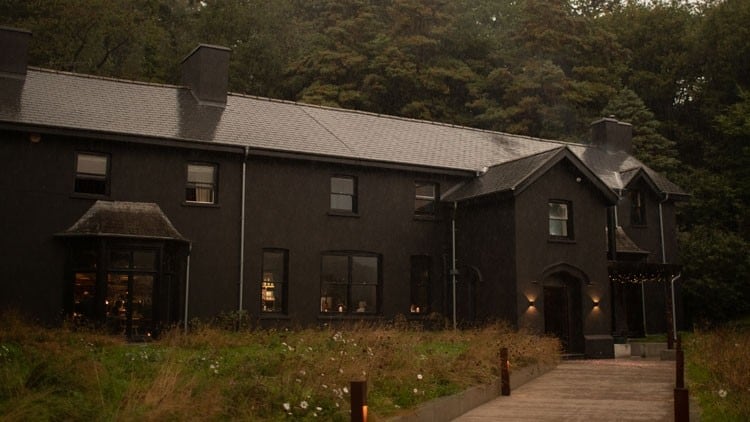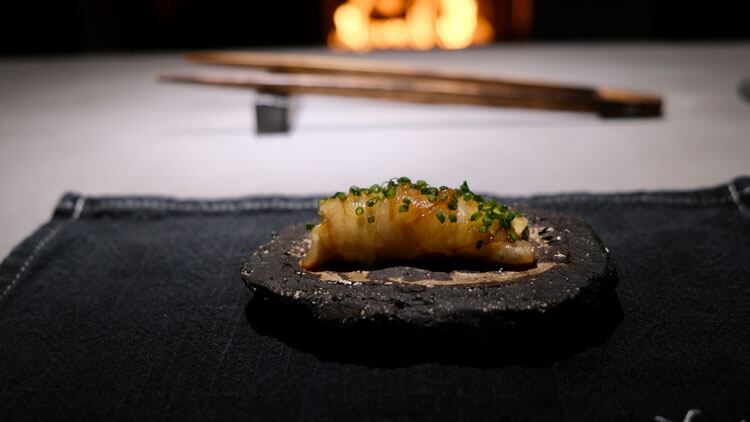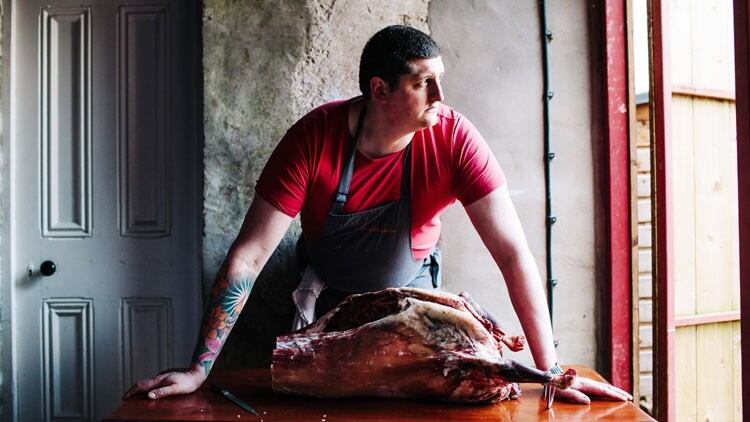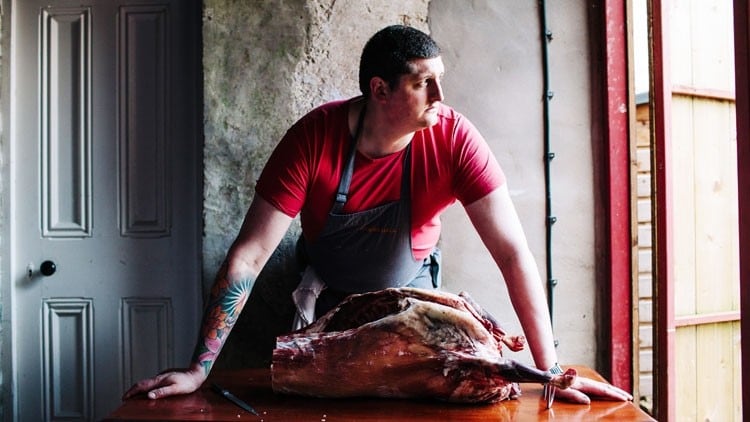Gareth Ward did not invent lengthy tasting menus. Nor did he pioneer the concept of using Asian ingredients and techniques to create small, high-impact morsels of food. And he certainly wasn’t the first chef to offer high-end dining in a casual setting.
Yet his West Wales restaurant Ynyshir – which was named the best place to eat in the UK earlier this year at the Estrella Damm National Restaurant Awards – is changing the face of the UK’s fine dining scene.
In plain terms, there probably hasn’t been a UK restaurant as influential as Ynyshir since Heston Blumenthal’s The Fat Duck introduced us to molecular gastronomy or Simon Rogan wrote the farm to fork rulebook with L’Enclume. But while these landmark restaurants encouraged other chefs to reappraise how they cooked and sourced their food, Ward’s approach has caused many to rethink the very fundamentals of how - and why - they run their establishments.
"Me and my staff are all having a great time and that’s what it’s about"
While Ward’s punchy, high-quality ingredient driven cooking is as original as it is brilliant the defining feature of Ynyshir is its chef patron’s determination to run it on his own terms. “I go to work for me, I cook for me, I don’t cook for anybody else,” he said recently. “I think you’re more likely to love it if I love it. The day I go to work and don’t love my job we close our restaurant and I move to Ibiza. Me and my staff are all having a great time and that’s what it’s about.”

Paint it, black: Gareth Ward's Ynyshir
Turning it up to 11
Ynyshir is an uncompromising – some would say extreme - experience. The tasting menu costs £350, runs to 30 courses and takes about four hours to get through. The music is loud, the lighting is more nightclub than dining room and the seating can hardly be described as luxurious. The restaurant also doesn’t really do dietaries (although it’s no longer the unapologetic meat fest it once was thanks to Brexit opening up access to high grade Welsh seafood).
But people like to be pushed outside their comfort zones, it seems. The Good Food Guide editor Elizabeth Carter says that Ynyshir is one of only a handful of high-profile UK restaurants to attract near unanimous adulation from her readers.
"You don’t feel judged. It’s too dark, anyway”
“We haven’t had an even slightly negative review for at least the past 12 months,” she says of Ward’s restaurant. “There are a few niggles about the length of the meal and the quantity of food but, overall, the feedback is resoundingly positive. People are wowed by it.”
Carter agrees that four hours is pushing it for any dining experience – especially one on a wooden bench with no cushion – but is nonetheless a devotee of the restaurant. “Gareth is a genius. When I went most recently it was mainly over 50 couples. They bopped to the music, the chefs bopped to the music. It's not going out for dinner; it's going out for an experience. There’s no dress code. You don’t feel judged. It’s too dark, anyway.”

One of around 30 dishes on the Ynyshir menu
Home improvement?
Other restaurants that have sought to emulate Ward’s unconventional, take-it-or-leave-it approach to running a restaurant haven’t necessarily fared so well. Ynyshir alumnus Zak Hitchman took elements from Ward's flagship with him when he relaunched Bristol restaurant Casamia on behalf of its chef founder Peter Sanchez-Iglesias during the pandemic.
Hitchman – who was given full creative control by Sanchez-Iglesias – opted for an approach that was more performative than Ward’s. The £250-plus experience was billed as ‘a weird gig with food’ and began and ended with the bashing of a gong. The (often more niche) playlist was designed to follow more closely the pacing of the menu, with the team artfully wafting grill smoke through disco lights to signal changes in tempo.
The beautifully choreographed experience was a lot less pretentious than that description might suggest but the rebooted Casamia split the room, with the restaurant attracting flak for its edgy, inflexible approach (the volume of the music and positioning of the speakers was a particular bugbear for many).
"It was a restaurant people either loved or hated"
Earlier this year, Sanchez-Iglesias pulled the plug on the restaurant saying that rapidly increasing costs had made the business ‘financially unviable’. But a lack of demand was also a factor in the decision, with the team struggling to reliably fill the dining room on Thursday evenings and Friday lunchtimes (the restaurant only operated five services a week).
"I'm very fond of Casamia,” says Carter, who has followed the exploits of Sanchez-Iglesias and his late brother Jonray since the pair took over their parents’ restaurant in the mid 2000s. “I was a little concerned when they changed things up during the pandemic, so I sent an inspector in. They loved it. But then we started to get polarising comments. It was a restaurant people either loved or hated. I didn't go myself, but I suspect I would have loved it too."
In one instance – documented by a The Good Food Guide reader report – Casamia was so far removed from what a guest had expected they ended up leaving the restaurant before a plate had event hit the table. To its credit, the Casamia team refunded the money that had been paid upfront and comp’d the two glasses of champagne consumed (the pair ended up at a PizzaExpress, so make of their decision what you will).
Ward has also had issues with his restaurant not aligning to guest’s expectations of what a fine dining establishment should be. “We still get people now again who watch James Martin [on TV] and book without doing any research or reading a review,” he says. “There’s nothing we don’t tell you – we send five emails that say we take no dietaries, the music’s loud, this is what you’re going to get but still people turn up and go ‘what is this?’ But we try our best to change their minds – 99% of the time they come away saying it was amazing.”
Most of the criticism levelled at Casamia could just as easily apply to Ynyshir. The difference, perhaps, is that the latter’s transition from a traditionally-run country house hotel restaurant to practitioner of bleeding edge fine dining was more gradual. When Ward and his partner Amelia Eiríksson took the restaurant and hotel on in 2013 they didn’t jump in with a 30-course tasting menu; the Ynyshir of today only really started to emerge around 2015, with the pair doubling down and extending the menu during the pandemic.
Casamia, by contrast, reopened in the August following the first lockdown under its more edgy guise. Hitchman, who declined to be interviewed for this piece, is understood to be seeking backing for a Bristol restaurant that will be run along similar lines to Casamia.

The writing's on the wall: Casamia's new look and approach split the room
Putting the fun into fine dining
What makes Ynyshir so interesting is how Ward has followed through with his vision. For years – decades even – chefs have promised to put the fun back into fine dining but the results have often been underwhelming – an absence of tablecloths and a sommelier with their top button underdone does not a fun dining experience make. Ward, by contrast, has delivered.
In doing so he has given more chefs and restaurant operators the courage to create the restaurants that they themselves would like to dine in. Kray Treadwell’s 670 Grams restaurant in the trendy Birmingham suburb of Digbeth, for example, is in part a response to the awkward fine dining experiences he had as a young cook.
“It was intimidating. I didn’t feel like I could relax and felt obliged to have the wine pairing when what I really wanted was a beer,” says Treadwell, who launched 670 Grams in 2020. The restaurant has been a big success, so much so that the chef will soon expand into the site next door to increase the size of the dining room from 16 to 26 covers.
Treadwell – whose CV includes Michael O’Hare’s Leeds restaurant The Man Behind the Curtain, one of several restaurants that opened ahead of Ynyshir that genuinely did put the fun back into fine dining – says that the experience was been designed with younger diners in mind.
“That’s not who we get through the door, though,” he admits. “Our customer base is mostly middle aged and upwards. The reality is that not many young people are able to pay £90 for a tasting menu. It’s good food in an atmosphere where you don’t feel judged. But if you want to go somewhere and have someone pull your chair out and tend to your every need it’s probably not the place for you.”
Like Ynyshir and Casamia, the music policy at 670 Grams is that whatever the team want to listen to goes. That means everything from grime to Bananarama, and Treadwell is not shy with the volume dial either. Even still, it’s yet to cause a single issue, although Treadwell does concede some of his music collection’s fruiter lyrics have given him cause to wince.
Another parallel between Ward and Treadwell’s approach is a focus on ‘relatable flavours’. In contrast to many top-end places, the two chefs are inspired by the sort of food they like to eat on their days off.
“Ingredients-wise, it's high-end. But the flavours are familiar,” Treadwell says. “My menu here is based around what we have in Birmingham. There's a lot of Asian influence. We're not anywhere near Ynyshir’s level but that’s certainly something we have in common.”

The dining room at Nathan Davies' SY23
Moving the needle
Most notable of all about Ward’s and, by extension, Treadwell’s approaches is how they are moving the needle on the very essence of what ‘fine dining’ actually is. The Good Food Guide’s Carter, for example, asserts that Ynyshir has shaken up the fine dining scene, going as far as to say that the restaurant has “changed the way we view fine dining”.
She’s not alone. Maybe even more significantly, the Ynyshir effect has cast its spell over the Michelin guide which, having largely pushed back against venues that didn’t take a more traditional approach (on these shores, at least) has started to embrace this change in more recent times.
Earlier this year Ynyshir was awarded its second Michelin star as an acknowledgement of this. Moreover, last year Treadwell was awarded the Michelin Young Chef Award Great Britain & Ireland for what he was doing at 670 Grams.
Another restaurant recognised by Michelin that has opened very much in the Ynyshir mould is Nathan Davies’ SY23 in Aberystwyth, just down the road from Ynyshir.
Davies, a former head chef at Ward’s restaurant, launched SY23 in December 2019 but it closed soon after because of the Coronavirus pandemic. It was named Opening of the Year in the 2022 edition of the Michelin Guide, and a day later was awarded a Michelin star despite having only been fully operational for a handful of months because of Covid restrictions.
In its description of SY23, Michelin states that Ward’s ‘influence is clear to see at this modern restaurant’.
“You can see the influences, I don’t hide away for that,” Davies said in an interview with BigHospitality earlier this year. “In fact, it’s something I’m very proud of. I embrace it because [Ynyshir] is one of the best restaurants in the country, if not the world.”
Ward didn’t invent multi-course tasting menus of single-bite dishes - to that we look to what Ferran Adria trailblazed at El Bulli. Nor did he invent dark restaurant interiors – Hakkasan Hanway Place, for one, stole the march on him by a decade and a half - or venues pumping out loud playlists. But in his uncompromising embracing of all these aspects, twinned with a ‘my way or the highway’ attitude he has broken new ground.
In a decade or so when commentators look to chart the restaurant industry shift that followed molecular gastronomy and a naturalistic, produce-led approach, the answer may well end up being ‘Ynyshir’.





